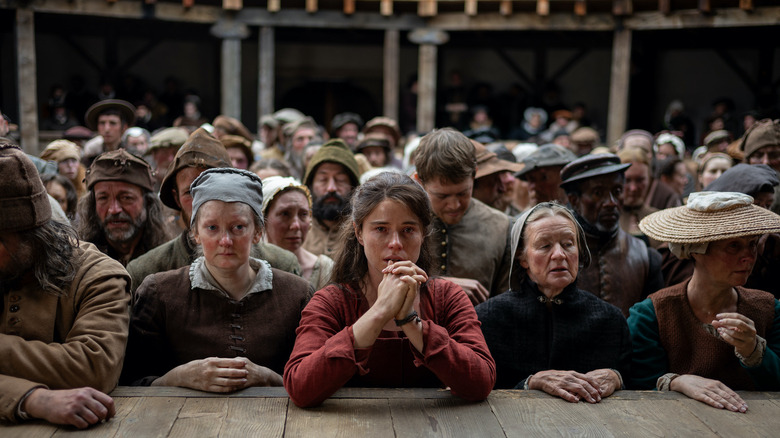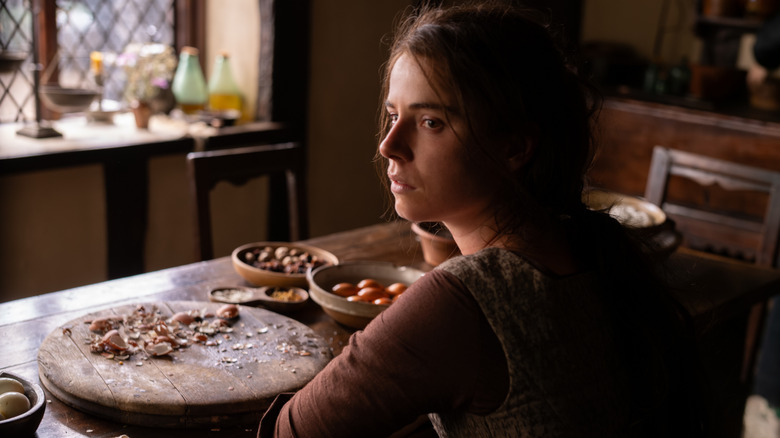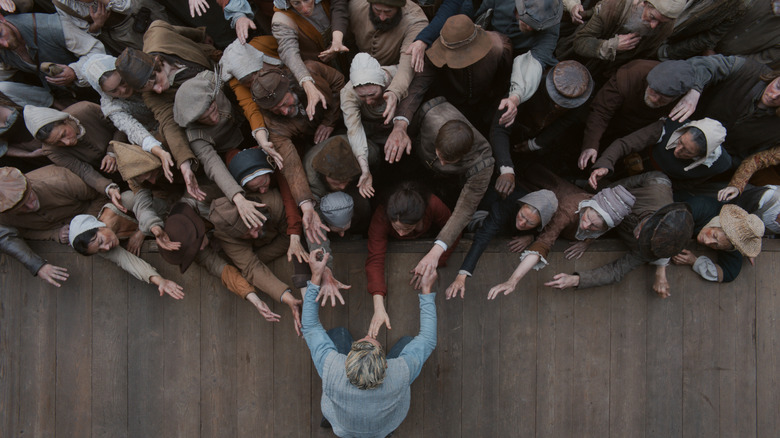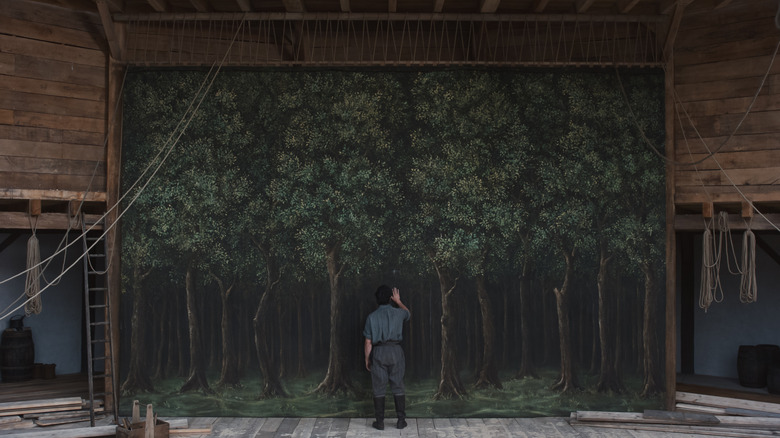Hamnet Review: Jessie Buckley Is Devastating In This Shakespearean Tragedy
William Shakespeare's work is immortal, but we actually know very little about the man's life. Indeed, Shakespeare's history is so shrouded in mystery that there's a long-standing conspiracy theory that he didn't actually write his plays (Roland "Independence Day" Emmerich even made a wonderfully silly movie about that). But we do know some things. We know that he was married, and that he had three children, and that one of the children — a boy named Hamnet — died young.
That name will likely catch people's attention since it's so close to "Hamlet," arguably Shakespeare's most famous play, adapted countless times in countless ways. In fact, during Shakespeare's time, the names "Hamnet" and "Hamlet" were virtually interchangeable. The connection is too intriguing to pass up, especially since "Hamlet" is a play full of ghosts, grief, and madness. Was Shakespeare's renowned tragedy inspired by the death of his own son?
That's the premise of Maggie O'Farrell's novel "Hamnet," which has now been adapted to the screen by Chloé Zhao (who co-wrote the script with O'Farrell). But Shakespeare isn't the main player here. Both book and film are instead focused on his wife. Her name is commonly known as Anne Hathaway, but some sources also record her name as "Agnes," and that's what O'Farrell calls her, likely because she realized that calling a character "Anne Hathaway" in this day and age would immediately make people think of the "Devil Wears Prada" star.
Jessie Buckley is brilliant and heartbreaking in Hamnet
In Zhao's film, Agnes is played with raw, brutal, heartbreaking intensity by Jessie Buckley, who lets out wails of pain and has a look of complete devastation on her face for multiple scenes. It is a brilliant, tragic performance, and even if nothing else in "Hamnet" works for you, I have a feeling Buckley's performance will.
Buckley plays Agnes in a bewitching, witchy way — she's an earthy outcast in her own family, prone to wandering through the woods and concocting herbal remedies to treat illness. One day she catches the eye of scruffy tutor William Shakespeare, played by indie film darling Paul Mescal. The chemistry between Buckley and Mescal is palpable, and the way he first approaches her and almost immediately feels drawn to kiss her conveys a genuine sense of dizzy passion.
The young couple is quickly wed and soon have children. First Susanna (Bodhi Rae Breathnach), and then twins Judith (Olivia Lynes) and Hamnet (Jacobi Jupe). The parents clearly love their children, but Will is all-consumed by his work and eventually heads off to London to become the most famous writer of all time. It's no spoiler to say that young Hamnet dies (that's history, folks!), setting off a wave of melancholy and turmoil in both Agnes and Will. Agnes is distraught to the point of being inconsolable while Will retreats both into himself and back to London for work.
Hamnet's final scene is a masterstroke
"Hamnet" has received some criticism for being little more than "misery porn." And indeed, the film is deceptively slight in its narrative — most of the characters keep their thoughts deep inside their own troubled heads, which means we don't really have much of an insight into how their grief is consuming them. And yet, Zhao finds ways to reflect it all, such as a perceptive moment where Will recites the famous "To be or not to be..." soliloquy to himself late at night, providing new context to one of the most well-known bits of dramatic dialogue.
Zhao also gives the film a natural, elemental quality — Agnes' connection to the earth is highlighted from scene to scene, and there are shots of textured nature that inspire a true sense of place and time. Everything here feels appropriately lived-in and genuine. I found much of this impressive, but I have to confess that I wasn't quite swept up in all the tragedy ... until the grand finale.
I of course want to avoid spoilers here, but I can tell you the film's big final scene involves Agnes attending the premiere performance of "Hamlet" at the Globe Theatre. The staging of this moment is so breathtaking, so powerful that it essentially justifies everything that's come before it. In a brilliant stroke of casting, Zhao has Noah Jupe, brother of Hamnet actor Jacobi Jupe, playing Hamlet on stage, immediately drawing a connection between the dead boy and the melancholy Dane for both the audience and Agnes. It's a remarkable sequence that burned itself into my thoughts.
There's hopefulness buried in the tragedy of Hamnet
Mescal is quite good and tender in these final moments, as Will grapples with his grief. But it is Buckley who remains the shining beacon that keeps "Hamnet" alive. The fact that she clearly and skillfully conveys most of her deep seated emotions through body language rather than dialogue only enhances how remarkable Buckley is here — anguished, haunted, reaching out across time and space for the ghost of her child.
This all may sound very bleak, and indeed, "Hamnet," with it's tender, button-pushing score from Max Richter, sometimes feels calibrated to make the viewer shed the maximum amount of tears. But there's also an element of hope, or at least joy, beneath all this sadness; hope that swirls around the very nature of existence itself. We have only a brief amount of time on this earth to make a mark on those who love us — and then we're gone.
The rest is silence.
/Film Rating: 8 out of 10
"Hamnet" opens in select theaters on November 26, 2025 and opens wide on December 12.



